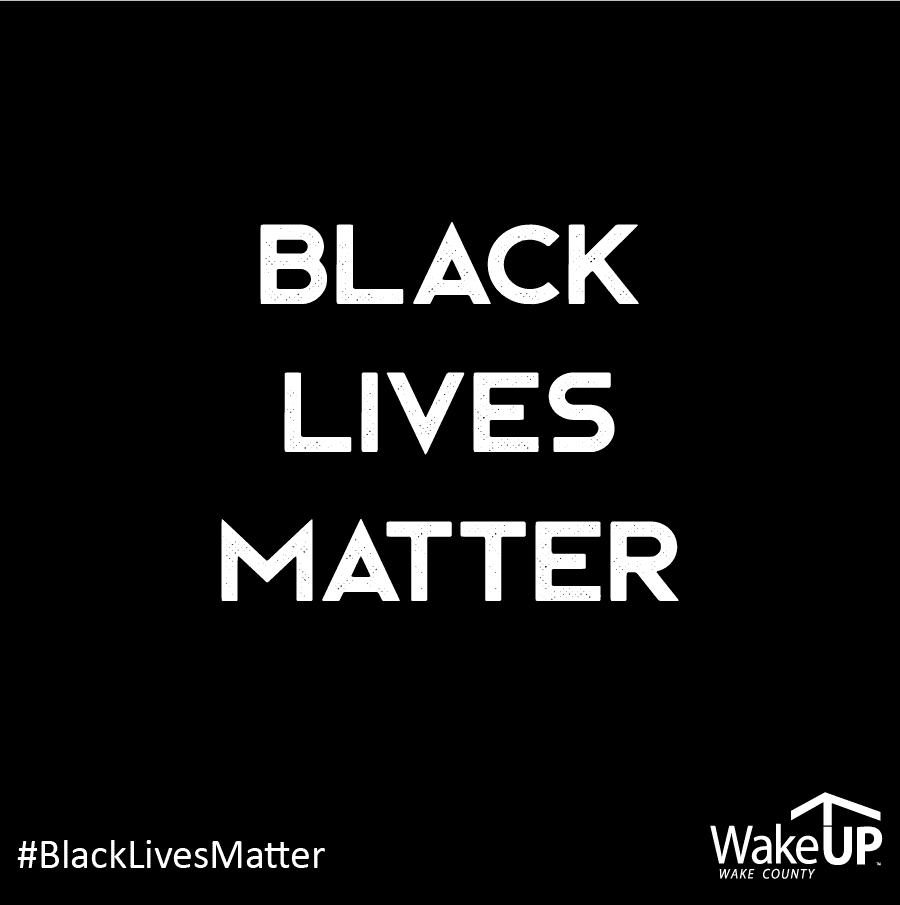Racial Injustice is Counter to Sustainable Growth: WakeUP Wake County Supports Black Lives
The following statement was written by WakeUP Board members Carly P. Jones and Kelly Lumpkin.

WakeUP Wake County rejects racism, injustice, and police brutality. We fervently believe that Black Lives Matter, and we fully support our community members working to change our present unjust and inequitable system. More generally, we are committed to uprooting the systemic racism that has been a part of Wake County since its founding in 1771, when almost half of its population was enslaved. We are reminded of this contentious history every day, as the offensive monuments honoring the confederacy still stand at our State Capitol with no plans for removal.
Let us be clear. Racial injustice is counter to sustainable growth. Racism is destructive, and it weakens our community and impedes our work on public transportation, education, healthcare, the environment, and affordable housing. As such, we are committed to looking at all growth issues through a lens of equity while working on these community concerns and policies to create prosperity and sustainability throughout all of Wake County.
In light of persistent racial injustices throughout our region and nation, WakeUP Wake County reaffirms our belief that diversity, inclusion, equity, justice, and safety are the pillars of a healthy, sustainable community. We pledge to amplify black and brown voices in our community efforts and to be a strong partner and committed ally to the many communities in our region that have been wrongfully neglected and denied the benefits of our county’s recent growth and economic prosperity. We have started this important work by adopting a new Diversity Plan, which will ensure our Board of Directors is representative of the community we serve and require all Board members and staff to participate in equity training.
Above all, we pledge to listen to and learn from the voices of those in our community with personal, lived experiences of institutional racism. We know full well we do not have all the answers that are needed during this challenging time, but we are ready to work together as one greater Wake County community.
And to all our fellow black and brown neighbors and community partners, we want to say this…
You matter, and we hear you.
Sincerely,
Carly P. Jones, Kelly Lumpkin and the entire WakeUP Wake County Board of Directors
Racial Inequities in Wake County:
African Americans represent only 20% of those who commute to work by driving alone, but they account for 41% of Wake County residents who commute to work using public transit [1].
African Americans represent only one fifth of the total population of Wake County, but they account for a full one third of all low-income households (i.e., those below 50% of the Area Median Income) [2].
As African Americans residents, we are the legacy of past racist decisions and policies in Wake County. But institutional racism doesn’t just impact residents’ present-day lives, it also impacts the lives and opportunities of future generations. For instance, areas of Wake County with the highest concentrations of African Americans generally have the lowest rates of upward social mobility [3].
References:
[1] U.S. Census Bureau, 2018 American Community Survey 1-Year Estimates
[2] Wake County Affordable Housing Plan (October, 2017).
[3] Opportunity Atlas, https://www.opportunityatlas.org/


